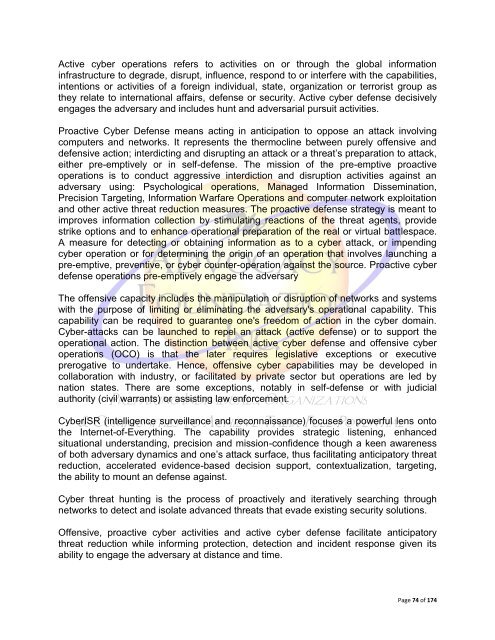International Cyber Terrorism
International Cyber Terrorism
International Cyber Terrorism
- No tags were found...
Create successful ePaper yourself
Turn your PDF publications into a flip-book with our unique Google optimized e-Paper software.
Active cyber operations refers to activities on or through the global information<br />
infrastructure to degrade, disrupt, influence, respond to or interfere with the capabilities,<br />
intentions or activities of a foreign individual, state, organization or terrorist group as<br />
they relate to international affairs, defense or security. Active cyber defense decisively<br />
engages the adversary and includes hunt and adversarial pursuit activities.<br />
Proactive <strong>Cyber</strong> Defense means acting in anticipation to oppose an attack involving<br />
computers and networks. It represents the thermocline between purely offensive and<br />
defensive action; interdicting and disrupting an attack or a threat’s preparation to attack,<br />
either pre-emptively or in self-defense. The mission of the pre-emptive proactive<br />
operations is to conduct aggressive interdiction and disruption activities against an<br />
adversary using: Psychological operations, Managed Information Dissemination,<br />
Precision Targeting, Information Warfare Operations and computer network exploitation<br />
and other active threat reduction measures. The proactive defense strategy is meant to<br />
improves information collection by stimulating reactions of the threat agents, provide<br />
strike options and to enhance operational preparation of the real or virtual battlespace.<br />
A measure for detecting or obtaining information as to a cyber attack, or impending<br />
cyber operation or for determining the origin of an operation that involves launching a<br />
pre-emptive, preventive, or cyber counter-operation against the source. Proactive cyber<br />
defense operations pre-emptively engage the adversary<br />
The offensive capacity includes the manipulation or disruption of networks and systems<br />
with the purpose of limiting or eliminating the adversary's operational capability. This<br />
capability can be required to guarantee one's freedom of action in the cyber domain.<br />
<strong>Cyber</strong>-attacks can be launched to repel an attack (active defense) or to support the<br />
operational action. The distinction between active cyber defense and offensive cyber<br />
operations (OCO) is that the later requires legislative exceptions or executive<br />
prerogative to undertake. Hence, offensive cyber capabilities may be developed in<br />
collaboration with industry, or facilitated by private sector but operations are led by<br />
nation states. There are some exceptions, notably in self-defense or with judicial<br />
authority (civil warrants) or assisting law enforcement.<br />
<strong>Cyber</strong>ISR (intelligence surveillance and reconnaissance) focuses a powerful lens onto<br />
the Internet-of-Everything. The capability provides strategic listening, enhanced<br />
situational understanding, precision and mission-confidence though a keen awareness<br />
of both adversary dynamics and one’s attack surface, thus facilitating anticipatory threat<br />
reduction, accelerated evidence-based decision support, contextualization, targeting,<br />
the ability to mount an defense against.<br />
<strong>Cyber</strong> threat hunting is the process of proactively and iteratively searching through<br />
networks to detect and isolate advanced threats that evade existing security solutions.<br />
Offensive, proactive cyber activities and active cyber defense facilitate anticipatory<br />
threat reduction while informing protection, detection and incident response given its<br />
ability to engage the adversary at distance and time.<br />
Page 74 of 174
















